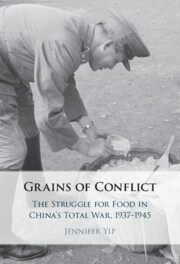Refine search
Actions for selected content:
3 results

Grains of Conflict
- The Struggle for Food in China's Total War, 1937–1945
-
- Published online:
- 23 August 2025
- Print publication:
- 31 July 2025
Introduction
-
- Book:
- Grains of Conflict
- Published online:
- 23 August 2025
- Print publication:
- 31 July 2025, pp 1-21
-
- Chapter
- Export citation
6 - And You Thought the War Was Hard: Ending the War and Securing the Peace
-
- Book:
- Why America Loses Wars
- Published online:
- 09 August 2019
- Print publication:
- 29 August 2019, pp 172-220
-
- Chapter
- Export citation
